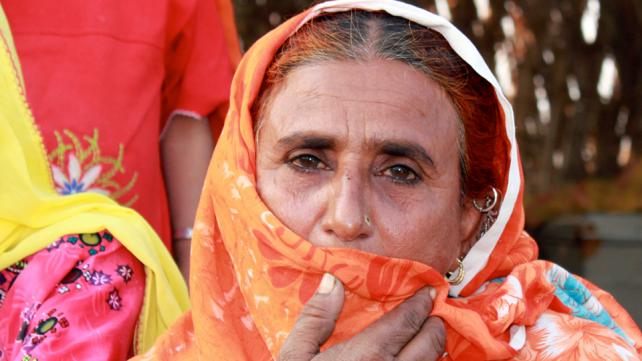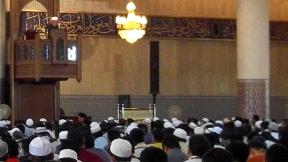
While in Muslim countries, the role of a Masjid’s Imam may be mostly to lead prayers and teach, in the United States and in other Western countries, it has expanded substantially.
These Imams do not only lead prayers, deliver sermons, officiate marriages, perform funeral ceremonies, and provide religious and spiritual guidance like other clergy. They also offer family counseling and mediation for parents and married couples.
We need help of American Imams in handling the curse of domestic violence. It is increasing in our community and here are some of the immediate causes of this.
While there is no replacement for proper training in these crucial areas, all Imams must learn the basics of domestic violence and how to deal with it. With that in mind, we are providing the following tips for Imams:
1. Listening to the Community
As an Imam, you are the listening post of the community. But are you listening? Are you accessible to women in your masjids? Do women know your phone number? Do you have a set time available exclusively for women when they can talk to you and discuss issues of concern directly with you?
2. Learning About the Problem
There are different types of abuse: physical, sexual, verbal, emotional and others. Know what types of abuse there are and familiarize yourself with their telltale signs. There is plenty of material on this subject which can be found on many web sites. You can start by reading from Sound Vision’s page on domestic violence. You can also acquire this information at police stations, women's centers and libraries.
It will also help if you read a few books about domestic violence, and added some good books on this topic in your Islamic center's library as well. As you are learning, please share this information with other leaders in your community.
3. Be proactive about domestic violence
Domestic violence can lead to the sister murdered and the brother being put in jail. Children would be separated from parents and most likely put in non-Muslim foster homes if this happened. It will also create another cycle of bad news for your community as has already happened in Chicago, Dallas, and Toronto. You can prevent all of that by being pro-active about domestic violence. If something still happens, God knows that you tried to prevent these things.
4. Understand that this is not a personal matter
Domestic violence is not a private matter between a husband and a wife that should be ignored. Domestic violence can lead to the destruction of a Muslim family, which is already so fragile in the current Islamophobic environment. The destruction of one family is the destruction of one unit of the Ummah. As leaders, Imams have a duty to help those suffering in this crisis.
Remember that Muslims must help their brothers and sisters, whether they are the oppressed or the oppressor as the Prophet has asked us to do, God’s peace and blessings be upon him. Not only must we help the sister who is being abused, we must also help the brother who is abusing by stopping him from this wrong.
5. Approach domestic violence as you would any social problem
Provide solutions, not just threats of Hellfire to men who abuse. Remember that a person who has this problem can change Insha Allah (if Allah wills) if there is help and support from the community and leaders like the Imam.
6. Know the services available
If your town has a Muslim-run battered women shelter, you are very blessed. Please do the following:
- keep their contact information handy
- put their info in the Masjid, Islamic center or community newsletter
- ask your board to support them financially
- help them raise funds for their shelter. A Muslim-run shelter in Chicago had to turn away 647 women and children in 2007 since they did not have enough space available.
However, the reality is that Muslim-run shelters don’t exist in most American cities. If no such shelter is available, please do the following:
- learn where the nearest battered women's shelter is
- keep the crisis hotline numbers available.
- Learn about safe houses, where women can stay if they are trying to escape from a violent husband.
- develop a relationship with the shelters so they can provide culturally sensitive service to abused Muslim women.
- support them financially. I personally know of a Masjid in Chicago which for years used Zakat funds to support a non-Muslim run shelter for abused women.
- Most shelters are run by professionals, so referring a victim to a shelter could be life-saving decision, instead of sending her back to home.
- give your contact information to a local women's shelter or a crisis line. Please don’t give them a number which no one picks up at masjids. This is important because when there is an emergency involving a Muslim woman who wants to contact Muslims, shelters and crisis lines can refer the woman to the mosque or Islamic center and the Imam or another Muslim representative.
7. Be able to assess a crisis and protection plans
Consult a counselor about knowing how to assess the level of crisis in a home and help women develop protection plans (see tips for victims of domestic violence in the West for details of the protection plan).
8. Prepare your community for zero tolerance
No one in America has more access to Muslims than Imams. Use this access to educate. It's easier to deny a problem exists when no one talks about it except in hush hush tones. But when an Imam starts giving Khutbas (sermons) on the topic and discusses it in Islamic study circles (Halaqas), men and women have to start taking it seriously.
A Khutba or several sermons on this topic could be structured in the following way:
- Start off mentioning that God likes men and women to have a cooperative relationship not a competitive one, as mentioned in the Quran (4:32).
- Mention the importance of God-consciousness (Taqwa) in the family relationship (4:1).
- Bring the discussion about the obligation of shura in the family to balance the community’s overemphasis on obedience in Muslim family life.
- Be clear and give examples of the kinds of abuse that do exist. For example, a husband regularly threatening to divorce his wife, intimidating her, telling her she is a failure, that she will go to Hell. Telling her he has a right from God to abuse her. Mention that abuse in Muslim homes includes pushing, slapping, punching, kicking, beating, bondage, and refusing to help a wife when she is sick or injured.
Be categorical that the last point in the Quranic advice (4:34-35) for the five steps in marital conflict cannot be a license for abuse and domestic violence because of the following three reasons:
- Remind people that the Islamic rules of good behavior apply to one's family just as much as to the Muslim community.
- Remind people that Allah does not turn down the Dua (supplication) of the oppressed person, and if a man is abusing his wife and she makes a Dua against him, Allah, if He wills, will accept it and make it happen.
- A note of caution: if you do decide to use a case study when talking about domestic violence, make sure to use examples from outside the town. Otherwise people will figure out people even if you do not mention their names.
9. Open up the mosque or Islamic center for abused women
Make sure the mosque or Islamic center is open at all times for abused women to seek refuge in. Remember that Muslim women would prefer to turn for help to their community before going to non-Muslim shelters and calling non-Muslim-run crisis lines. Making sure the mosque is a "safe spot" can make women consider it one of their first points of refuge in an emergency. Ensure there is adequate safety in the mosque for women fleeing violence. Prepare written guidelines for your assistants in case someone approaches the Masjid in your absence.
10. Make yourself available
Make sure that your contact information and timings of Imam availability are well-known to all in the community, through announcements, web sites., newsletters and bulletin boards. All Imams should have a pager where people can easily reach them in emergencies. There should be one locked mailbox which only you can open. There should be an email address for those who want to seek guidance maintaining their anonymity.
11. Establish a social services system or committee
In cooperation with Muslim social service professionals in your community, establish a committee which will develop a system of social services in your community to tackle issues like domestic violence in Muslim homes.
12. Set up support groups
In mosques and Islamic centers, encourage the establishment of support groups for abusers and the abused (separately) so they can share their experiences with other Muslims who may have suffered from domestic violence as well. Make sure the group is run by wise, trustworthy men and women.
13. Make Dua
As a leader of the community, the well-being of its members is part of your responsibility. Make Dua that God helps you in this heavy task. Please lead the community in collectively praying that He eases the difficulties of all those suffering in the community, men, women and children. Also pray for our neighbors who are suffering from this problem of domestic violence. Nearly one-third of all American women (31 percent) report being physically or sexually abused by a husband or boyfriend at some point in their lives.








Comments
Domestic violence
I totally agree that some men are victims of domestic violence, but are too ashamed to come out and admit to it because they feel less of a man that a woman is abusing them. This is one of the barriers to them seeking help also, and an adverse effect of most of our cultures which promote men as the stronger sex (i.e men don't cry)!!! Imams have a lot to do in eradicating domestic violence. They must constantly preach against it in their Friday sermons (Khutbahs), promote events/presentations where this issue is addressed. And most importantly do not treat the issue of domestic violence as the big elephant in the room that must be avoided at all costs. Please try to address the issue of Quraan 4:34 about hitting their wives with a chewing stick, which I think is just a figure of speech. BUT much needs to be done to really address this verse which is constantly being abused by men. Salam Alaykum.
Location
Salamo Alaykom wa rahmatto
Salamo Alaykom wa rahmatto ALLAH wa barakatto - This is an excellent article voicing what is truly needed in all communities. May ALLAH protect all peace makers and those who try to remedy wrongs instead of condemning. For the sake of ALLAH I wish I had a safe house to help others. JazakALLAH Khair
Location
Good advice. I do feel frustrated, however, by the fact that the victims in domestic violence are always portrayed as being the men* .There needs to be support for men equally!
Location
Good advice. I do feel frustrated, however, by the fact that the victims in domestic violence are always portrayed as being the victims. There needs to be support for men equally!
Location
I second that; I have seen
I second that; I have seen and heard of many families where husband is the victim of physical or verbal abuse. Every time I tried to bring up this issue, I was always made fun of, and I believe this is the very reason men never stepped forward and ask for help.
4 1/2
Location
As a neighbor, I am happy to see this issue addressed. Many people see Muslims as not respecting women.
Location
What Step has our community in Toronto taking to prevent domestic violent. Same goes to senior abuse. please help and support my cause in islamic Senior Care Canada and Fight Senior Abuse. toghether we will win and help muslim community one step at a time. Preventing any abuse in society is our muslim duty!Cause on Facebook. http://www.causes.com/causes/532956?recruiter_id=147200736
Location
I would like to know how many Imams have taken this advise and opened up the Islamic Centers to abused women. Do Muslim women have any recourse except to go to non-Muslim run centers?
Location
Domestic Violence is such an pervasive problem in all societies. It is wonderful to see a national website promoting information and awareness about this important topic. Thank you.
Location
Pages
Add new comment